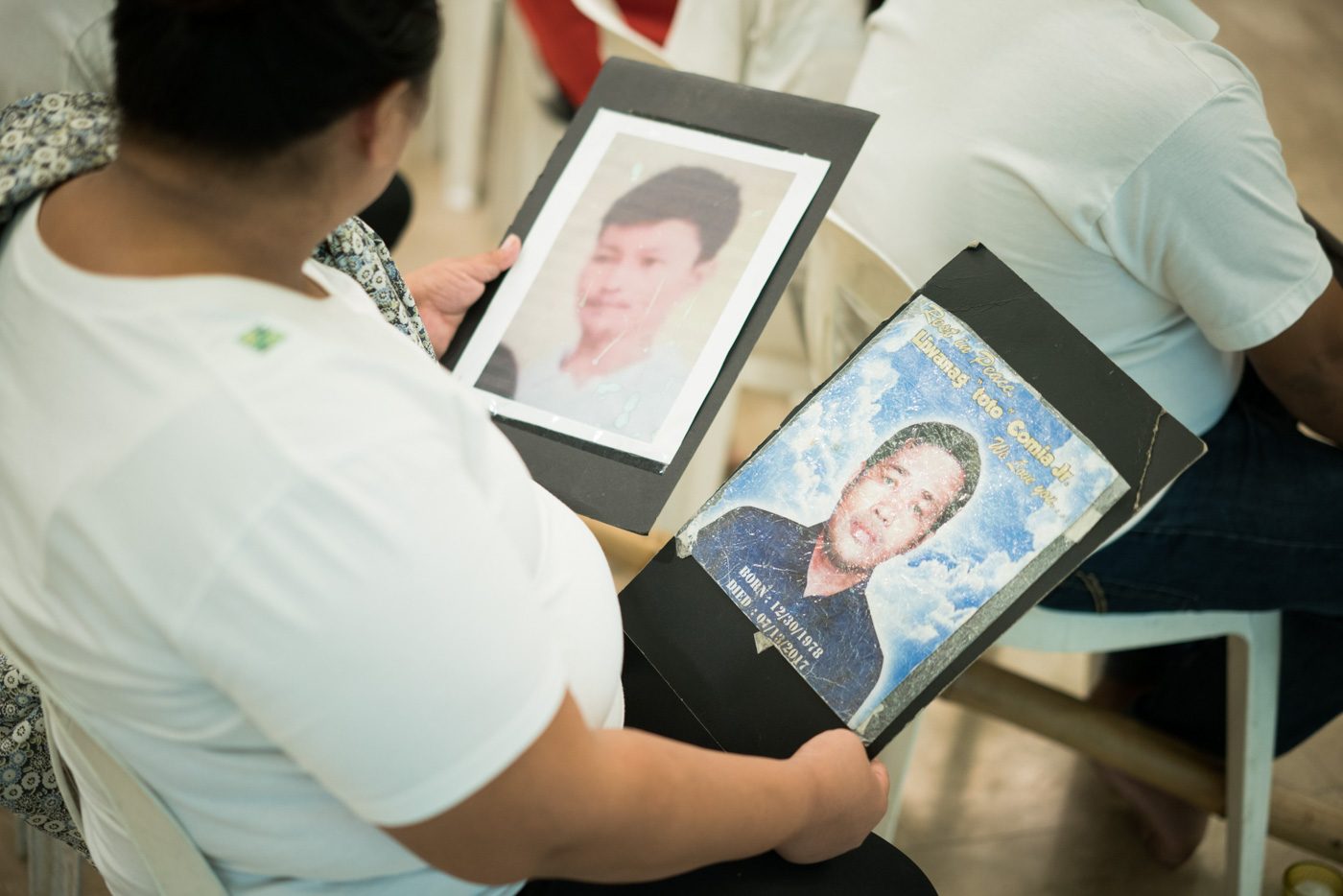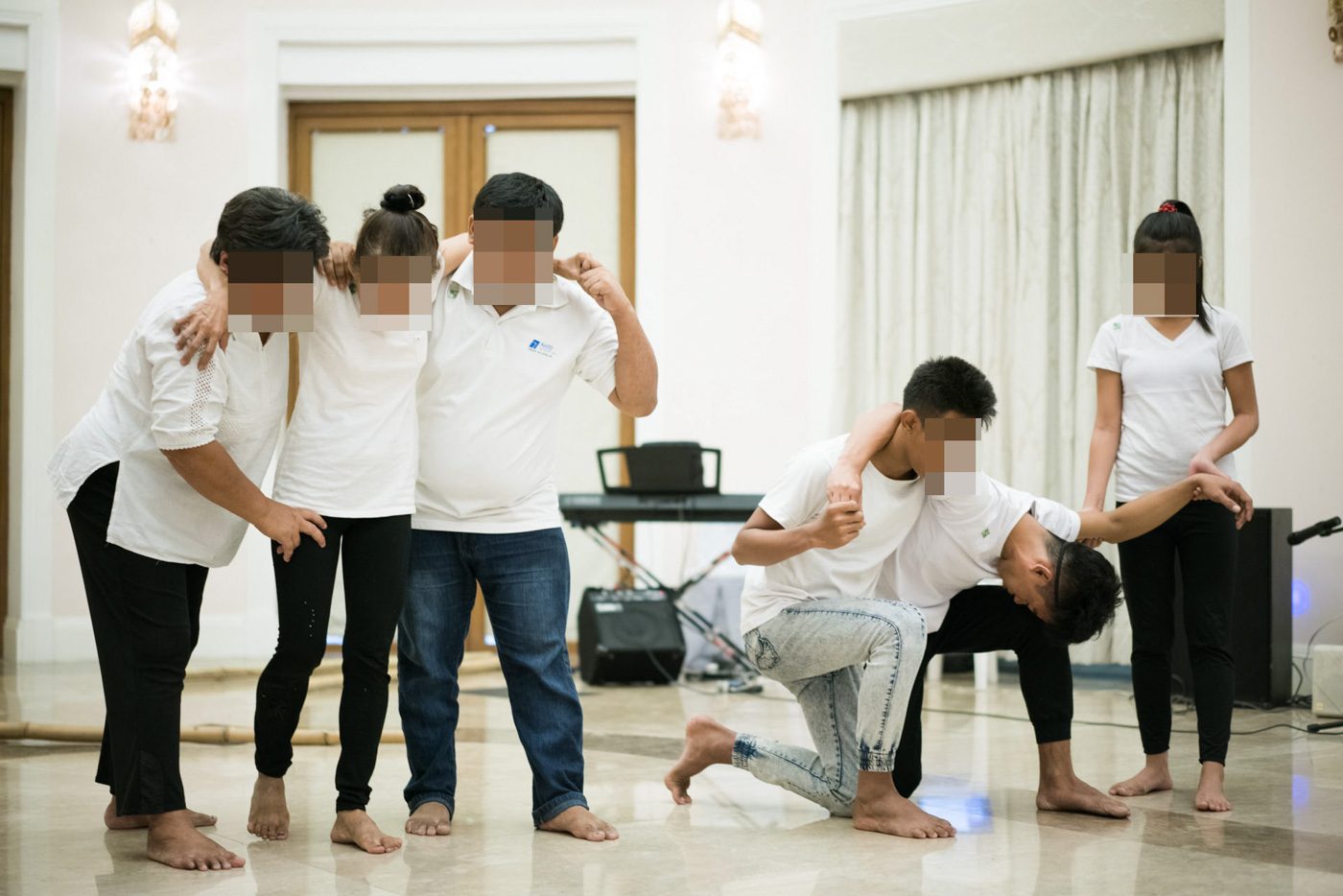SUMMARY
This is AI generated summarization, which may have errors. For context, always refer to the full article.

MANILA, Philippines — Widows and orphans clad in white shirts scramble around the floor, hands in the air and tears in their eyes, theatrically recounting the days and nights their loved ones were killed in anti-drug operations called Oplan Tokhang.
Hit songs blared through the venue as performers criticized President Rodrigo Duterte’s war on drugs by recreating the murders, and holding photos of their deceased husbands and children who died in extrajudicial killings (EJKs).
They also held signs that read, “Stop the killing, start the healing,” and signs that cited the Bible verse Deuteronomy 27:19 (“Cursed is anyone who withholds justice from the foreigner, the fatherless or the widow”).
These performers are part of the Widows-Orphans Wellbeing group, and are undergoing theater therapy provided by the Saint Arnold Janssen Kalinga Center in Tayuman, Manila.
The Kalinga Center has reached out to the homeless and to families of Tokhang victims through holistic care since Father Flavie Villanueva founded it in 2015.
Focus on the homeless
Villanueva founded the center with caring for the homeless in mind, as he said the homeless are the most wounded among the marginalized.
“Being reassigned to a place surrounded with immense poverty, I asked the question, what can we do, and how can we bring Christ in their lives?” he said.
He said that aside from those without houses, the homeless include those who lack “basic tender, loving care,” especially in the face of Duterte’s anti-drug campaign.
“When the war on drugs took place, it has become so centered and so grossly wrong. I thought again of the question again: How can we help these victims, just like the homeless? They’re being marginalized, they’re being singled out,” he said.
Villanueva then created the Healing Intervention Leading to Optimum Management in the Rehabilitation of Significant Others of EJK Victims, or Program Paghilom. The program was developed to reach out to families of Oplan Tokhang victims, particularly widows and orphans. This propelled the formation of Widows-Orphans Wellbeing.
Recounting his own experience as a drug user for around 16 years, he said he cannot separate his past struggles from those of the Project Paghilom beneficiaries. (READ: Holy Week reflections: From drug addiction to priesthood)
“I had my experience of being rejected, dejected, of being alone, of being misunderstood, of being maligned. All of these contribute to that desire to help the former Flavies. That’s how I would put it, ano?” Villanueva said.

Expression of reality
Program Paghilom introduced theater as a form of therapy for widows and orphans, to allow them to heal from the loss of their loved ones, as well as to educate and to raise awareness among their audience.
Theater, he explained, helps create awareness. “When we talk about what’s going on, you cannot help but recognize that it’s the poorest of the poor who have fallen victim to this systematic evil of Tokhang,” Villanueva said.
As of March 20, the Philippine Drug Enforcement Agency has recorded at least 4,075 killings in anti-drug operations since the war on drugs was launched on July 1, 2016. More than 16,000 murders have been classified as deaths under investigation.
The Widows-Orphans Wellbeing first staged a play on April 20 in La Salle Greenhills, Mandaluyong, before being invited by the Office of the Vice President to perform in Robredo’s headquarters on June 4. (IN PHOTOS: Robredo watches play by drug war orphans, widows)
Villanueva also disagrees with the criticism of theater therapy as a form of retraumatization, as he believes retraumatization only takes place “without proper guidance or processing” from professionals.
“If their stories are well cared for and protected, then theater, which you have seen, is a viable means also to help them go through their healing,” he said.
Widows and orphans who receive care through Program Paghilom undergo a minimum of 12 Saturdays of psychospiritual intervention, with the help of psychologists and social workers. This intervention includes theater workshops, as well as memory art therapy workshops.
‘Dignified, holistic, systematic’
Villanueva’s vision of empowering the homeless stemmed from the desire to simply provide them with food and hygiene. His initiatives through the Kalinga Center then became more holistic with the rise of Oplan Tokhang cases, which gave birth to the 5 stages of Program Paghilom.
The first stage of the program focuses on providing food and health care for the beneficiaries, while the second stage focuses on psychospiritual intervention. The third stage allows the Kalinga Center to provide legal assistance, and requires the beneficiaries to file affidavits. The fourth stage deals with educational assistance, while the final stage focuses on the livelihood and employment of the beneficiaries.
Volunteers for feeding, cleaning, and workshops were once beneficiaries of the Kalinga Center. Previous beneficiaries have also published testimonies on the Kalinga Center’s official website.
Through the Kalinga Center’s holistic initiatives, Villanueva hopes to create a cycle of “the victim becoming the servant,” and of “the wounded becoming the wounded healer.”
“There is this sense of how hope is drawn from a very bitter, depressing situation, and of finding the reason to stand up, to seek healing, to be empowered, so that they can empower one another,” he said. — Rappler.com
Gaby N. Baizas is a Community intern at Rappler, and is an incoming senior at the Ateneo de Manila University. She is an AB Communication major under the journalism track.
Add a comment
How does this make you feel?
There are no comments yet. Add your comment to start the conversation.